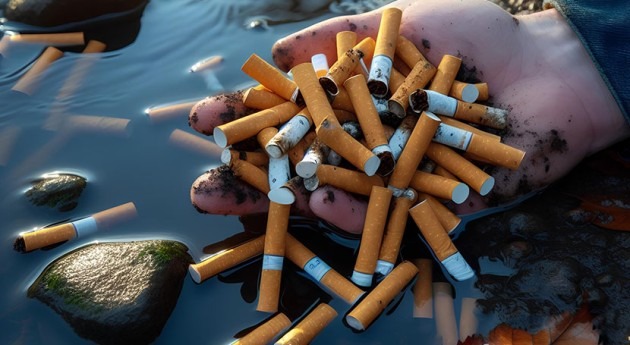Cigarette butt litter is a pervasive issue globally, with an estimated 4.5 trillion cigarette butts discarded annually worldwide. In the UK, cigarette butt pollution represents a significant environmental challenge, adversely impacting water bodies and ultimately jeopardizing the quality of drinking water. While the direct effects of cigarette butt pollution on UK drinking water have received limited attention, the cumulative environmental consequences warrant closer examination.
Adverse effects and impacts on drinking water
Cigarette butt litter poses a significant threat to the quality of UK drinking water, with several potential consequences including:
- Chemical contamination
Cigarette butts contain a cocktail of toxic chemicals, including nicotine, heavy metals, pesticides, and other harmful substances. When discarded on streets or in water bodies, these chemicals can leach into the surrounding environment, contaminating soil and water sources. Studies have shown that nicotine and other compounds from cigarette butts can persist in aquatic ecosystems, posing risks to aquatic life and potentially entering drinking water supplies. The accumulation of toxic chemicals from cigarette butts in water bodies underscores the urgent need for measures to prevent further contamination and safeguard water quality.
- Microplastic pollution
One of the lesser-known but equally concerning aspects of cigarette butt pollution is its contribution to microplastic pollution in waterways. Cigarette filters, made of cellulose acetate, do not readily biodegrade and can break down into smaller pieces over time. These microplastics can absorb and accumulate harmful chemicals, posing threats to aquatic organisms and ecosystem health. Furthermore, microplastics from cigarette butts can enter the food chain, potentially exposing humans to health risks through the consumption of contaminated seafood and drinking water. The prevalence of microplastics derived from cigarette butts highlights the need for comprehensive strategies to address plastic pollution in water bodies.
- Impact on aquatic life
Discarded cigarette butts pose direct threats to aquatic life, with marine animals and birds often mistaking them for food. Ingestion of cigarette butts can lead to physical harm, internal injuries, and even death in marine organisms. Moreover, the chemicals leaching from cigarette butts can disrupt physiological processes and reproductive cycles in aquatic species, exacerbating biodiversity loss and ecosystem degradation. The cumulative impact of cigarette butt pollution on aquatic ecosystems underscores the importance of concerted efforts to reduce littering and mitigate environmental contamination.
- Economic costs and social implications
The economic costs associated with cigarette butt pollution extend beyond environmental cleanup efforts to include expenses related to water treatment, public health impacts, and lost revenue from tourism and recreational activities. Additionally, the aesthetic degradation of water bodies due to cigarette butt litter can deter visitors and residents from enjoying these natural resources, diminishing the quality of life and cultural heritage of affected communities. Addressing the economic and social implications of cigarette butt pollution requires collaborative action from policymakers, stakeholders, and the public to promote responsible waste management practices and foster a culture of environmental stewardship.
Conclusion
Cigarette butt pollution poses a multifaceted threat to UK drinking water quality, with far-reaching implications for environmental, economic, and public health. To mitigate the adverse effects of cigarette butt pollution on water bodies and safeguard drinking water supplies, proactive measures are needed to address the root causes of littering, promote recycling and waste reduction initiatives, and invest in sustainable alternatives to conventional cigarette filters. By raising awareness, enforcing regulations, and fostering collective responsibility, we can work towards a cleaner, healthier environment for present and future generations.


